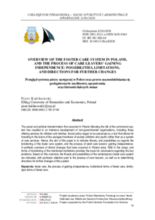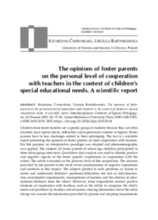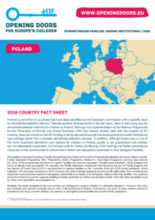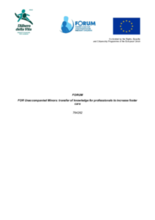Displaying 21 - 30 of 50
This article presents the content concerning foster care as the tasks of the district government: the types of foster families, legal and organizational aspects of this form of care and the essence of the organization of foster care at county level are discussed.
This article presents a study conducted amongst young adults between the ages of 19–35. The aim was to determine the relationship between the information about foster care families and the attitude of young adults towards them.
The subject of investigation in this study is the principles of foster care, including the assumptions and solutions.
The presented analyses aim at depicting social discourse concerning the process of care leaving.
The aim of this paper is to indicate threats and possibilities as regards the functioning of the foster care system and the process of adult care leavers’ gaining independence.
This report presents the opinions of foster parents in Poland on their cooperation with teachers.
Join this webinar to walk through the PROMISE Child Participation Tool and to discuss approaches and considerations for soliciting children’s views on their Barnahus experience.
The purpose of this webinar is to shed light on the specific experiences and issues of unaccompanied and separate girls in the European Response.
This factsheet highlights the developments and challenges still ahead in Poland and offers key recommendations to the EU and the national government to ensure that children are cared for in family-based settings.
This article is written as part of the FORUM project (FOR Unaccompanied Minors: transfer of knowledge for professionals to increase foster care), an EU funded project which sought to enhance the capacity of professionals to provide quality foster care for unaccompanied migrant children, primarily through the transfer of knowledge. The article aims to contribute to this transfer of knowledge by bringing together literature which is of relevance to professionals developing or enhancing foster care services for unaccompanied migrant children.




